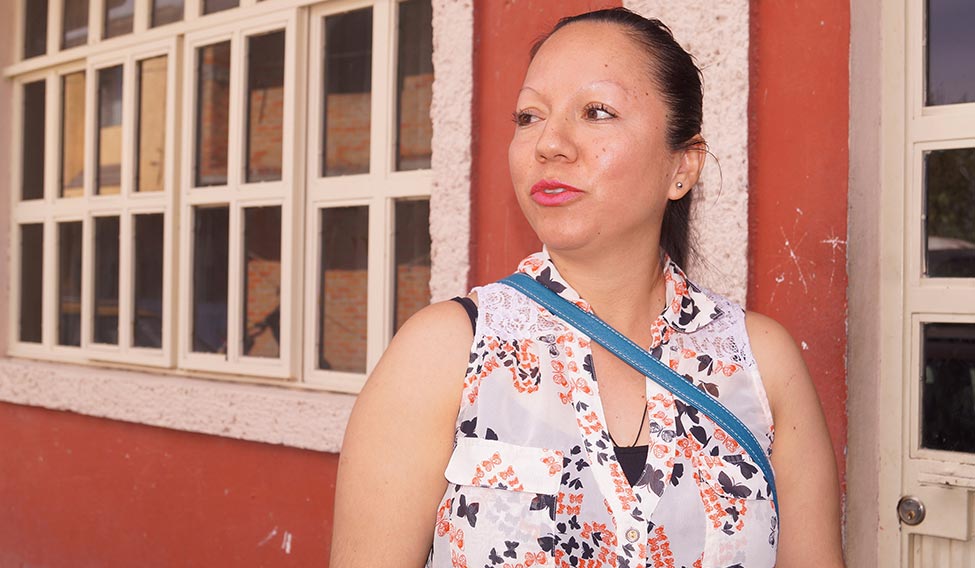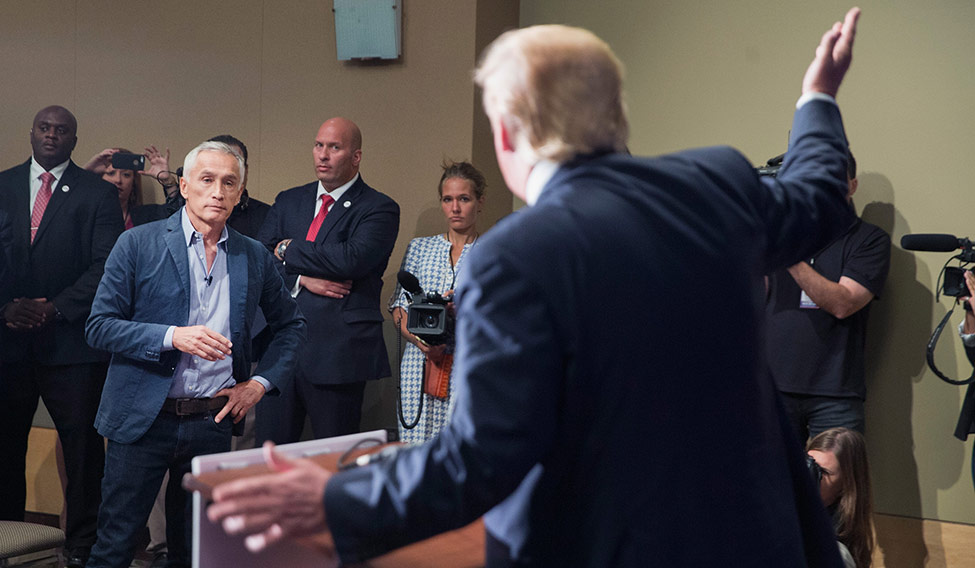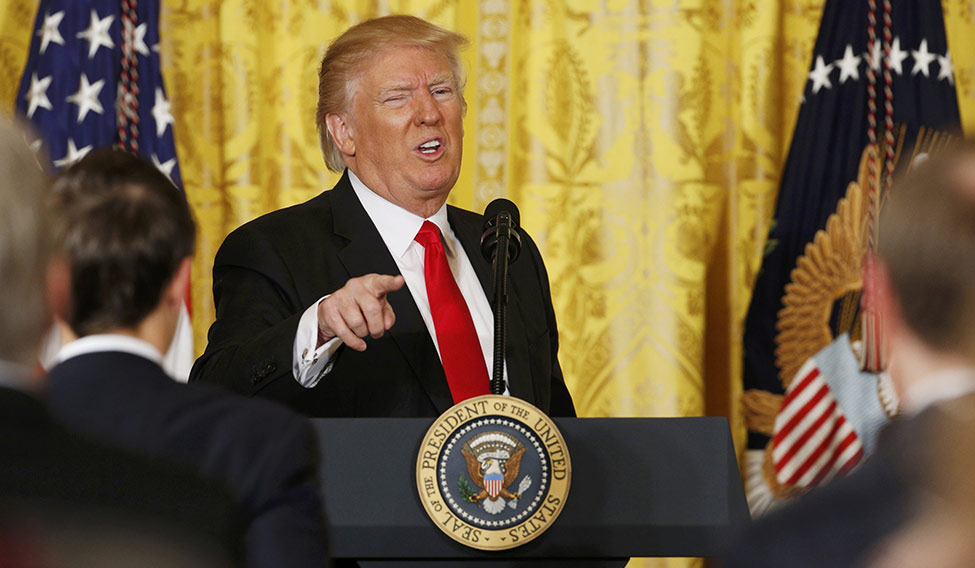People keep asking me how I’m doing, as though I’ve suffered a death in the family or been struck by a terminal illness. I understand why, and I’m grateful for the concern: President Donald Trump’s anti-immigrant proposals are materialising one after another, and he’s been in the White House for less than a month.
Lately, families of Latino immigrants in the United States are feeling a lot of fear. It’s understandable. On a recent Univision newscast, we featured a story about undocumented parents who are making emergency plans in case they’re deported. The worst-case scenario is already playing out: In Phoenix this month, a married mother of two children, Guadalupe García de Rayos, was deported after living in this country for more than 20 years without papers. Others will follow.
The cause of the dread within the Hispanic community is the recent flurry of executive orders signed by Trump, namely the absurd directive to build a wall along the southern border with Mexico, along with the temporary ban on refugees as well as people from seven predominantly Muslim countries: Iran, Iraq, Libya, Somalia, Sudan, Syria and Yemen.
These policies have changed deportation priorities. The Los Angeles Times recently reported that as many as eight million undocumented immigrants could now be at risk of being deported, not just those whom Trump has called “bad hombres”, unless he believes that all eight million of these people qualify for that term.
Nevertheless, I feel optimistic for several reasons.
After Trump was inaugurated, we saw hundreds of thousands of people gather in Washington, DC, to protest a man who has called women pigs, and who characterised Mexican immigrants as criminals and rapists during his campaign. The absence of dozens of members of Congress from Trump’s inauguration ceremony was symbolic and important. There are times when you simply must say no. And for the first time, I’ve heard parents tell their children, “I don’t want you to be like the president.”
The media has also embraced its duty as a counterbalance to power. Journalists have refuted Trump’s lies, for example, his insistence that millions of undocumented immigrants voted against him, or that the nation’s murder rate is at its worst level in 47 years. Trump now knows that he can’t lie with impunity.
Also, dozens of high-profile companies have supported the state of Washington’s legal move against Trump’s ban on refugees and immigrants. In a recent statement, Howard Schultz, the Starbucks CEO, said, “We will neither stand by, nor stand silent…. There are more than 65 million citizens of the world recognised as refugees by the United Nations, and we are developing plans to hire 10,000 of them over five years in the 75 countries around the world where Starbucks does business.”
The opposition to Trump extends beyond the United States, too. Mexico’s president, Enrique Peña Nieto, maintains his policy of appeasement in dealing with Trump and doesn’t seem to understand that bullies feed on other people’s weaknesses. But thousands of Mexicans are choosing an alternate path and resisting Trump’s policies on social media and in the streets, action that’s more dignified, intelligent and practical.
A first step towards resistance is exactly what happened recently in the UK. John Bercow, the speaker of the House of Commons, doesn’t want Trump to address the British parliament this year. Why? Because of “our opposition to racism and to sexism”, according to Bercow. While a final decision has not yet been made, Bercow has stood his ground.
 Painful return: Guadalupe García de Rayos arrives in Mexico after she was deported from the US, where she lived for 20 years | Reuters
Painful return: Guadalupe García de Rayos arrives in Mexico after she was deported from the US, where she lived for 20 years | Reuters
These examples are reasons for hope. Resistance is how change begins.
Trump isn’t a king or a dictator. Unlike Hugo Chávez in Venezuela, Trump can’t commandeer Congress, the supreme court, the army and the media, nor can he change the constitution in order to stay in power forever. More than two centuries of American democracy should count for something.
The resistance to Trump is rising, and millions of people in the US and around the world are stating quite clearly that they oppose him and his policies. Trump might be the president, but millions don’t respect him. That’s Trump’s main weakness, and that’s where my optimism begins.
Ramos is a veteran journalist and author.
Manifest Despair
I’VE ALWAYS publicly acknowledged that the United States gave me opportunities that Mexico, my country of origin, did not. But decades after I arrived here, the anti-immigrant rhetoric being turned into policy under Donald Trump has made me realise that I just don’t recognise this country anymore.
In the early 1980s, moving to the US meant that I could speak freely. As a journalist in Mexico, I was censored. Moreover, the US provided me with a job and economic opportunities that I couldn’t have found anywhere else. With boundless generosity, America protected me and granted me the same rights as any other citizen, even though I was an immigrant. I work here. I vote here. My children were born here.
All I want is for new immigrants to enjoy the same opportunities that I, and millions of others throughout American history, have received. But for the moment, Trump is making that impossible.
When the president signed an executive order announcing that a wall would be built along the Mexican border, he also issued a directive that radically changes deportation priorities in this country. Now, anyone who “committed acts that constitute a chargeable criminal offence” may be deported, even if they were never convicted. Also, immigrants who have committed “fraud… before a government agency” are to be deported as well, which presumably applies to any noncitizen who has ever used a fake driver’s licence or made up a social security number in order to work.
Translation: Deporting almost all of the 11 million undocumented immigrants living in the US is now a priority. If this is truly the case, will there soon be widespread raids on homes or workplaces? This executive order makes it seem that anyone who is deemed deportable by an immigration officer is at risk.
And Trump, who aspires to be like President Ronald Reagan, refuses to even consider granting undocumented residents a path to citizenship. Since Republicans control both the House and the Senate, Trump could easily push to give immigrants a chance to stay in the US. But he won’t. In 1986, Reagan, recognising the contributions of immigrants, and with the greater good of the country in mind, granted amnesty to about three million undocumented people. But Trump would rather expel them.
 Muzzled voice: Trump orders Ramos out from his news conference held in Dubuque, Iowa | Getty Images
Muzzled voice: Trump orders Ramos out from his news conference held in Dubuque, Iowa | Getty Images
Gag order
IN AUGUST 2015, a couple of months after Trump characterised Mexican immigrants as criminals and rapists, and announced his plan to build a wall along the Mexican border, I asked him for an interview. He responded by putting my phone number on the internet.
So I showed up at a news conference that Trump was holding in Dubuque, Iowa. I raised my hand, stood up and started to ask my question. Trump didn’t like that. He ordered me to shut up and sit down. “Go back to Univision,” he said, then sent a bodyguard to escort me out of the room.
Perhaps Trump has issues with Latino reporters. I was thrown out of a news conference; Jim Acosta, a correspondent from CNN, was forbidden to ask questions and then put on warning; and during the campaign, Trump also insulted ABC News’ Tom Llamas, calling him a “sleaze” for his reporting on Trump’s charitable donations.
Nowadays it has become a badge of honour to be publicly criticised by the him. He has very thin skin, and raising his ire often demonstrates that reporters are getting closer to the truth.
Trump doesn’t seem to get that, when it comes to journalists, he’s not in charge. At Univision, I’m lucky to have a couple of wonderful bosses who give me absolute freedom to do my job. The company has never told me what to say.
My real bosses are the people who watch and read my work. Being independent and telling them the truth is my biggest responsibility. I answer to them, not to Trump.






